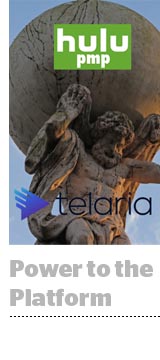
Remember when Hulu opened its automated private marketplace at the beginning of 2019? Turns out Telaria is the vendor that’s powering it.
As part of a two-year deal, Hulu will use Telaria’s tech to enable its PMP for advertising across all screens, the video ad platform said Wednesday – from the big one in the living room to the small one in the back pocket.
It’s an extension of a partnership that goes back to 2017, according to Hulu VP and head of ad platforms Jeremy Helfand.
Also, Telaria will develop custom solutions to accommodate Hulu’s unique needs, because the demands when serving an ad on a 60” OLED are significantly different than serving an ad on an iPhone.
Hulu’s thinking about automating ads across screens centers around data and creative.
“With respect to the big screen, you want to make sure you’re delivering a relevant experience in terms of the content that’s recommended and the advertising that’s delivered,” Helfand said. That means anticipating who’s watching in the living room and making sure the ad is relevant to that person.
On the creative side, Helfand said ads need to add to the viewer’s experience. Hulu needs to manage the frequency with which ads are shown, and ensure brand separation, so competitors don’t show up in the same pod.
For advertisers, the stakes are much higher when messaging viewers in an immersive big screen environment, so the technology that automates the ad buying and delivery process needs to be on point.
“The targeting and the relevancy and competitive separation – all of those things need to be right on,” said Telaria CEO Mark Zagorski. “You’re having a more intimate moment with that consumer. You’re around a piece of content someone spent $20 million developing. You’re not in a preroll on a blog that someone is just glancing at.”
Telaria can already handle those needs, Zagorski said, having built CTV capabilities in recent years. Once known as Tremor Video, Telaria spun off its demand-side business in 2017 and focused on the supply-side.
It first worked with Dish’s Sling TV doing live programmatic insertions and expanded from there.
“When I joined 18 months ago, 2-3% of revenue came from CTV,” Zagorski said. “Fast-forward today and you’re looking at close to 30% from CTV.”
He anticipates CTV will be a majority of Telaria’s business in the future.
But grabbing that CTV business is fiercely competitive. On the supply-side, the competitive set includes SpotX, Google and Comcast’s FreeWheel.
For Hulu, offering an ad buying process that’s easy and automated could entice marketers, and better targeted ads could raise CPMs and reduce ad loads, attracting more consumers.
This post was syndicated from Ad Exchanger.


More Stories
Is Tegna Looking to Hub Weather in Its Local Markets?
Stuff Group taps Belinda Francis to lead North Island Markets
Veteran Meteorologist James Spann Voices Support for NOAA and NWS in Anticipation of Trump Cuts